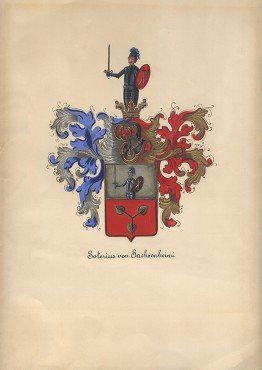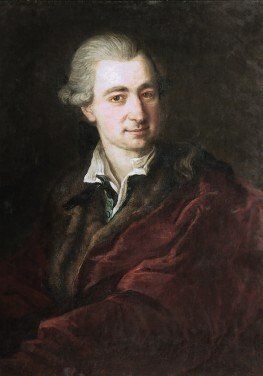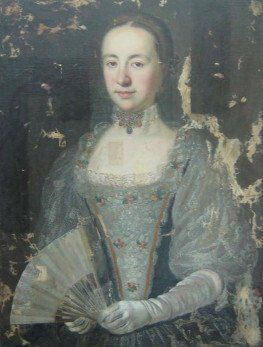Johann Michael (The Elder) S.v.S. 1742-1794
Was given the 'von Sachsenheim' title in 1792 for services to the country by Emperor Leopold II.
Johann Michael (The Elder) was born in Schellenberg on 25th November 1742, the cheerful and happy pastor's son spent his childhood in Stolzenburg. Of him we know that he started his studies at the Hermannstadt gymnasium4. It is likely that, as the son of a pastor who was in receipt of the Stolzenburg tithes, he was able to lead a comfortable life. It is unknown whether Soterius enjoyed the privilege of his ancestors to attend German universities. He may have, like his friends Straußenburg and Heydendorf, straight after finishing school, acquired the Hungarian language in order to join the governmental administration. His uncle Samuel von Bruckenthal would probably have recommended to him, to best learn his job in practice within the administration itself.
In any case, Soterius was made "Gubernialkonzipist"13 as early as 1771. At work he was extremely diligent and he eagerly wrote studies on Saxon history. He also worked with Heydendorf, Filtsch, Brandsch and others at the Hermannstadt archive. It was one of his favourite tasks to browse the town hall's old mighty chests for important documents.
On May 6th 1770, Johann Michael Soterius married 18 year-old Anna Mara Filtsch, daughter of the Hermannstadt parish pastor (table 6). An absolute highlight for Frau Soterius was a long flattering laudation to her by the Monarch himself during a celebration hosted by Baron Bruckenthal, in honour of the Emperor Joseph II's presence at his palace in Hermannstadt. The speech, which of course had been written by her husband, was even published in the "Kaiser Königlich allergnädigst privilegierte Anzeigen"14 (table 7). It would have been quite a triumph for her, when 13 years later during his subsequent visit, the Emperor asked for her and, when she was absent, sent for her.
Soterius was very musical. He wrote down music by ear and he also composed. Frau Soterius did not only happily engage in social life, she also had the ambition to be a good housewife. The same precision with which she had recorded every detail of her conversation with Emperor Joseph II, she would apply upon household budget book keeping. Her recipes are still being used today by many of her great-grandchildren and are often praised. In 1771, the oldest child was born. The baby girl was baptised Anna Maria. Although Hermannstadt was plague infested, extensive christening celebrations were held. In 1786, Soterius became Gubernialsekretär15, a position that enabled him to achieve even more in his people's favour. After Bruckenthal's retirement in Hermannstadt, a frequent social contact between the two families evolved. He loved his nephew, who helped him to organise his coin collection and to expand and organise his library. Soterius himself owned considerable collections.
The little daughter was followed by two boys. Johann Michael, the Younger, later became Generatperceptor16 and the patriarch of an extensive family. The younger brother Charles died of smallpox as a child aged 14 years (table 8).
Following the Edict of Restitution in 1790, a decision was made in 1791 to send a delegation to the Emperor. Mayor Rosenfeld and Soterius were deployed on behalf of the Saxons. The Saxon nation wanted to put forward their own proposal for regulation. Another memorandum was drawn up. Soterius provided the material and Tartler finalised the script. In January 1792, the delegation travelled to Vienna. For this journey, Anna had made an embroidered silk vest (table 19) for her husband, which is still in the possession of the family. For the Rosenfeld and Soterius families, those weeks in Vienna turned out to be a very pleasant affair. Both delegates had taken their wives and daughters.
At the same time, Johann Michael was given nobility status by Emperor Leopold II, who conferred the title of nobility of “von Sachsenheim" upon him and his descendants.
The original patent of nobility, handwritten on parchment, with the hand-painted family coat of arms is in the possession of the author (tables 10 & 11).
A full translation of the patent of nobility, drawn up around 1900 is also shown in the tables (tables 12-16).
A beautifully embroidered moneybag of Johann Michael, the Elder’s, worn around the neck, is still in my possession.
Soterius of Sachsenheim died on 31st March 1794 in Klausenburg, where the family had moved, after it had become clear that the seat of the provincial government was to be permanently located there (table 17). Bruckenthal too regarded him very highly indeed, which is shown in the following passage in the governor's will. In 1802, he wrote: ’In case, that even the female Samuel von Bruckenthal line should lack any male descendants, it is my will, that all my assets, both fixed and circulating, with the sole exception of the collections stated below, should be transferred onto my nephew's, Johann Michael Soterius of Sachsenheim's succession with immediate effect. He will act also in the capacity of a fiduciary, so that, as I have ordered above, my heritage should be passed on from a single male heir to the next.’
This article is taken from the family history book compiled by Fritz Soterius von Sachsenheim.
This document has been translated by www.janserKraft.com


